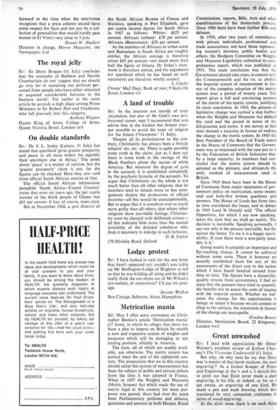Metrication mania
Sir: May I offer some comments on Chris- topher Booker's article `Metrication mania' (27 June), in which he alleges that there has been a plot to impose on Britain by stealth a new and expensive system of weights and measures which will be damaging to our trading position, notably in America.
The facts, all of which are readily avail- able, are otherwise. The metric system has existed since the end of the eighteenth cen- tury. The proposition that we in this country should adopt this system of measurement has been the subject of public and private debate from the time it was adopted in France. When in 1897 the Weights and Measures (Metric System) Act which made the use of metric legal in this country for most pur- poses was passed, there had over the years been Parliamentary petitions and debates, questions and answers in both Houses, Royal
Commissions, reports, Bills, Acts and other manifestations of the democratic process. Since 1900 there have been further Bills and debates.
In 1950, after two years of consultation with private individuals, professional and trade associations, not least those represent- ing women's interests, public bodies and ,others, the Hodgson Committee on Weights and Measures Legislation submitted its com- prehensive report, which was published in 1951. The main conclusion was that the Government should take steps, in concert with the Commonwealth and the us, to abolish the imperial system of measurement in fav- our of the complete adoption of the metric system over a period of twenty years. The report gives a full and convincing account of the merits of the metric system, justifying its main conclusion. In 1963, the process of legislative change was carried a step further when the Weights and Measures Act defined the yard and the pound in terms of the kilogramme and metre. A am survey at that time showed a majority in favour of making the change to the metric system. In 1965 the then President of the Board of Trade stated in the House of Commons that the Govern- ment was so impressed with the case put to it by the Federation of British Industries that. by a large majority, its members had con- cluded that the metric system should be adopted as the primary, and ultimately the only, method of measurement used in Britain.
Since 1965 there have been in the House of Commons three major statements of gov- ernment policy on metrication, some twenty oral and forty-five written questions and answers. The House of Lords has from time to time considered the issues, and in debate in 1969 Lord St Oswald said: 'The official Opposition, for which I am now speaking. takes the view that we shall go metric. The decision is. inevitable. Speaking personally, I say not only is the process inevitable, but the sooner the better. To me it is a happy inevit- ability. If ever there were a non-party issue, this is it.'
Going metric is certainly an important and far-reaching change. It cannot be achieved without some costs. There is however no soundly established basis for any of the assessments of the direct cost to the nation which I have heard bandied around from time to time. The figures have a dream-like quality remote from accountancy. I find no signs that the guessers have tried to quantify the benefits nor to assess the costs of staying with the imperial system. Whether we wel- come the change for the opportunities it brings, or resent it because we are content to cling to the antique, the arguments in favour of the change are inescapable.
Gordon Bowen Director, Metrication Board, 22 Kingsway, London wc2






















































 Previous page
Previous page